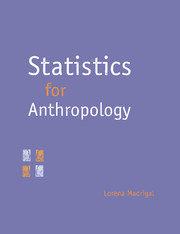Book contents
- Frontmatter
- Contents
- Preface
- 1 Introduction to statistics
- 2 Frequency distributions and graphs
- 3 Descriptive statistics: measures of central tendency and dispersion
- 4 Probability and statistics
- 5 Hypothesis testing
- 6 The difference between two means
- 7 Analysis of variance (ANOVA)
- 8 Non-parametric comparison of samples
- 9 Simple linear regression
- 10 Correlation analysis
- 11 The analysis of frequencies
- References
- Appendix A Answers to selected exercises
- Appendix B A brief overview of SAS/ASSIST
- Appendix C Statistical tables
- Index
5 - Hypothesis testing
Published online by Cambridge University Press: 05 June 2012
- Frontmatter
- Contents
- Preface
- 1 Introduction to statistics
- 2 Frequency distributions and graphs
- 3 Descriptive statistics: measures of central tendency and dispersion
- 4 Probability and statistics
- 5 Hypothesis testing
- 6 The difference between two means
- 7 Analysis of variance (ANOVA)
- 8 Non-parametric comparison of samples
- 9 Simple linear regression
- 10 Correlation analysis
- 11 The analysis of frequencies
- References
- Appendix A Answers to selected exercises
- Appendix B A brief overview of SAS/ASSIST
- Appendix C Statistical tables
- Index
Summary
In chapter 1 we discussed the use of statistical analysis in the scientific endeavor. Not only do statistics allow us to summarize and understand our data, but they permit us to test hypotheses about the population from which data are collected. The marriage between statistical analysis and scientifichypothesis testing is elegantly expressed by G.M. Jenkins (1979): ‘The preoccupation of some statisticians with mathematical problems of dubious relevance to real-world problems has been based on the mistaken notion that statistics is a branch of mathematics – in contrast to the more sensible notion that it is part of the mainstream of the methodology of science’ (italics in original). Fisher (1959) mentions that the people who developed (now classic) statistical tests did so in the midst of a research problem. The statistics were developed to answer a scientific need. This chapter introduces the reader to principles of hypothesis testing, and how statistics are used for this scientific purpose. Examples of such tests are included.
The principles of hypothesis testing
Earlier in the book it was mentioned that a scientific hypothesis is one which can be tested. This testing proceeds (basically) in the following manner.
State the null (HO) and alternative (HI) hypotheses.
Establish the level of statistical significance.
Collect the sample.
Compare the sample with the null hypothesis, and reach a conclusion about which hypothesis to accept.
- Type
- Chapter
- Information
- Statistics for Anthropology , pp. 77 - 95Publisher: Cambridge University PressPrint publication year: 1998



